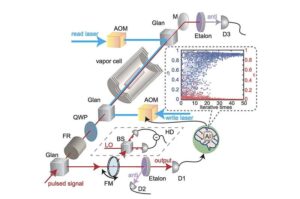
Researchers from China have made significant strides in the development of quantum memory, achieving remarkable efficiency and fidelity in storing quantum information. Led by Professor Weiping Zhang from Shanghai Jiao Tong University and Professor Liqing Chen from East China Normal University, the team reported their findings in a paper published on November 15, 2025, in the journal Physical Review Letters.
The new approach allows quantum memory to achieve an efficiency of 94.6% and a fidelity of 98.91%, which is critical for practical applications in quantum information processing. Efficient quantum memory is vital because it needs to store and retrieve over 90% of input quantum information while ensuring that the recovered state closely matches the original.
Innovative Techniques in Quantum Memory
The breakthrough arises from a technique that improves atom-light interactions during the storage of quantum information. Previous methods often introduced undesirable noise, which compromised the fidelity of the stored data. Zhang’s team introduced a far-off resonant Raman scheme, which not only enhances storage efficiency but also allows for faster optical signal storage compared to earlier methods.
Utilizing a mathematical technique known as the Hankel transform, the researchers developed a robust method for adaptively controlling quantum memory. This technique is a pivotal advancement, as it reveals the physical mechanisms behind atom-light mapping in quantum memory, according to Zhang. He emphasized the importance of achieving near-unity efficiency and fidelity, describing it as a long-standing challenge that has driven extensive research in the field.
Future Implications for Quantum Technologies
The new quantum memory technology has been tested using a warm vapor of rubidium-87 (87Rb), and its success could pave the way for enhanced quantum technology applications. This includes long-distance quantum communication, improved quantum computers, and advanced distributed quantum sensing systems. Zhang noted that their future research will focus on exploring new physics-driven principles and integrating this quantum memory into quantum repeaters, which are essential for fault-tolerant quantum computing architectures and networks.
The advancements made by Zhang and his team represent a crucial step toward the realization of more effective quantum memories, potentially transforming the landscape of quantum information science. Their research not only highlights the mathematical intricacies involved but also sets a new benchmark for the performance of quantum memory systems.
This article has been fact-checked and reviewed to ensure accuracy and credibility. The findings are a testament to the ongoing efforts in the field of quantum physics, showcasing how theoretical developments can lead to practical innovations with far-reaching implications.







